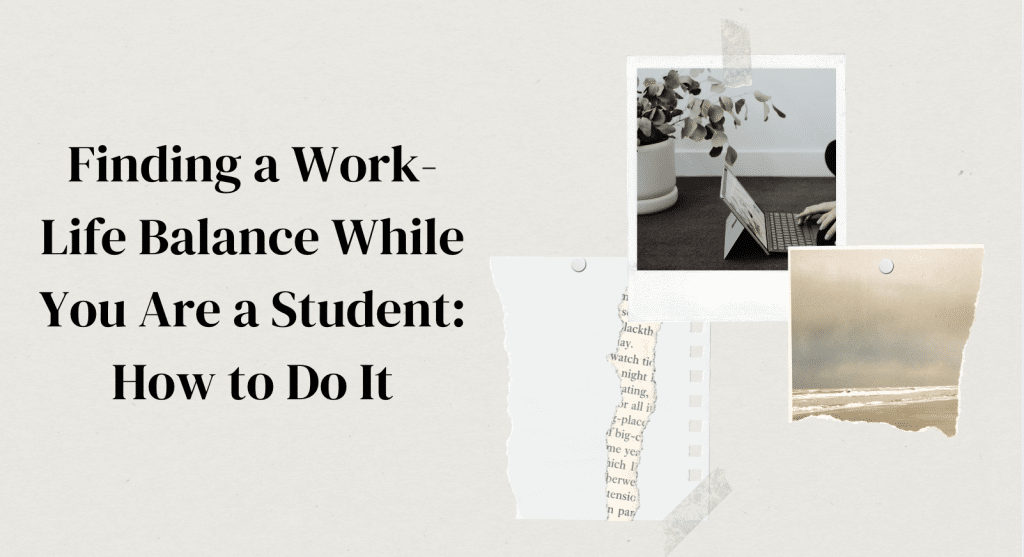Given the continual pressures of academics, part-time employment, social events, and extracurricular activities, reaching a work-life balance as a student could seem like a far-off fantasy. Many students find it difficult to juggle; the sheer weight of their obligations usually overwhelms them. Still, striking a good balance requires an awareness of the psychology underpinning stress, drive, and well-being rather than only time management.
For some students, this means they will pay for homework or hire native English speakers for money to ensure their work is up to standard, giving them more time to focus on other important areas of their lives.
These shortcuts could provide some relief. However, they also raise significant concerns regarding the long-term repercussions of outsourcing academic work on personal growth and academic integrity among students.
The Psychological Difficulties in Pursues of Work-Life Balance
Psychologically, the pressure of being a student can lead to feelings of burnout, anxiety, and stress. The American College Health Association (2019) reports that forty percent of students feel worried and sixty percent feel overwhelmed by their schoolwork. These numbers show the mental toll of balancing school work, personal life and sometimes even a job.
The problem lies in the brain’s response to constant demands. Students that strive to multitask and move between tasks cause cognitive overload in the brain that could lower output and raise stress. “Cognitive load theory,” a fundamental psychological idea that clarifies this, holds that the brain can only process a given quantity of information at once. Too much work or study hours without breaks can overload the brain and reduce the quality of work and relaxation.
Expert Insights: Setting Boundaries
Emphasizing the need of establishing clear boundaries to preserve a good work-life balance, professional psychologist Dr. Sarah Jensen specializes in student mental health. “Whether it’s for academic assignments, part-time employment, or social responsibilities, students sometimes feel they have to be always accessible. But for mental health, establishing limits—such as specific study sessions or periods for self-care—is absolutely vital,” she says.
Saying “no” is absolutely necessary for self-preservation, claims Dr. Jensen. This is realizing when to back off and rejuvenate, not about neglecting duties. “It’s about stressing your health above the fear of missing out,” she counsels.
Time Management: The Key to Balance

While setting boundaries is essential, time management is a powerful tool for creating balance. Time management skills are particularly critical for students who are trying to handle both academic and social aspects of life. Time management guru Dr. Michael Williams says “students often overlook the importance of planning ahead, which results in last-minute cramming and increased stress.”
The Pomodoro Technique, in which one studies for 25 minutes then takes a five-minute break, is one successful tactic. After four Pomodoros, students take a longer break. This method helps maintain focus and reduce mental fatigue. Research by Cirillo (2006), the inventor of the technique, showed that this style of working enhances productivity and prevents burnout, making it easier to create more leisure time outside of studying.
Case Studies: Students Who Found Success
“When I started managing my time better and enjoying my free time, I saw a big jump in both my grades and my mood,” Emily says. She started using the Pomodoro Technique and also started doing yoga.
Similarly, Carlos, a graduate student, shares his journey of balancing work and studies. “I used to think I needed to be perfect in every area of my life—top grades, great relationships, and a full-time job. But I learned that perfection wasn’t the goal. I started saying no to some social events and reducing my work hours. This allowed me to focus better on my studies and overall health.”
Carlos also emphasizes the importance of having a support network. “I talk to my friends about my struggles. It helps to hear that I’m not the only one going through it.”
The Role of Technology: Enhancing or Hindering Balance?
In the digital era of today, students’ way of life is much shaped by technology. One hand, technologies like Google Calendar, Trello, and mindfulness apps like Headspace can increase well-being and output. Conversely, the continuous access to social media and other distractions could undermine concentration and raise stress.
Studies from the University of California, Irvine (2012) revealed that, following technological interruption, it takes an average of 23 minutes to recover focus. Students must so learn to maximize technology and yet impose restrictions to avoid digital temptations.
Key Technology Tools for Work-Life Balance
|
Tool |
Benefit |
Potential Drawback |
|---|---|---|
|
Google Calendar |
Helps organize tasks, deadlines, and appointments |
Can become overwhelming if too many events are scheduled |
|
Trello |
A visual project management tool for organizing tasks |
Can distract if used excessively or for non-productive purposes |
|
Headspace (Mindfulness App) |
Reduces stress and enhances focus |
Overuse can lead to too much screen time, counteracting the goal of relaxation |
|
Social Media Apps |
Can foster connections and support networks |
Often leads to procrastination and reduced focus |
|
Pomodoro Timer Apps |
Enhances productivity by encouraging focused work intervals |
Can be less effective if interruptions are frequent |
Students have to find a balance by using technology to remain focused while being aware of its possible distracting power. Better work-life balance results from setting time restrictions on non-essential apps and concentrating on using tools that increase productivity.
Expert Tips for Creating a Balanced Student Life
- Prioritize Your Health
Maintaining a balanced existence depends mostly on sleep, exercise, and appropriate diet. Dr. Sarah Jensen counsels, “Without these, productivity and well-being suffer.” Taking care of your body and mind aids in mental clarity restoration and energy renewal.
- Practice Mindfulness
Techniques for mindfulness like meditation help to lower stress and sharpen concentration. Studies reveal that mindfulness reduces anxiety and aids in decision-making—two vital skills for keeping balance.
- Set Realistic Goals
Divide big jobs into doable chunks. Staying focused and avoiding becoming overburdened requires SMART goals. One goal at a time will help you to remain on target. - Learn to Delegate
You need not accomplish everything yourself. When feasible, assign work—daily assignments or group projects alike. Sharing chores promotes community and helps to lower stress.
- Reflect Regularly
Spend some time every week evaluating how you manage life and business. Change your plans or objectives to make sure you are not ignoring your health or welfare.
- Set Boundaries and Say No
Protecting your time and mental space calls for knowing when to say no. Establishing limits helps you avoid needless worry and emphasize what’s most crucial.
Applying these basic techniques can help you to have a better balanced student life and concentrate on the really important issues.
The Balance is Fluid
Establishing a work-life balance as a student is a unique journey for each individual. It is an evolving process that demands self-awareness, adaptability, and effective time management. Psychological insights show that managing cognitive load, setting boundaries, and prioritizing health are essential to maintaining balance. Learning from professional guidance, actual case studies, and scientific research helps students not only survive but also flourish in the demands of college life.
Ultimately, it’s about establishing a sustainable schedule that lets room for both work and leisure rather than about exactly juggling every element of life. Reaching equilibrium is a road trip rather than a destination.




















